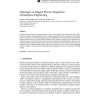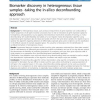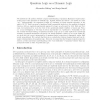419 search results - page 64 / 84 » Using Matrix Decompositions in Formal Concept Analysis |
CMOT
2000
13 years 7 months ago
2000
Enterprise design knowledge is currently descriptive, ad hoc, or pre-scientific. One reason for this state of affairs in enterprise design is that existing approaches lack an adeq...
BMCBI
2010
13 years 7 months ago
2010
Background: For heterogeneous tissues, such as blood, measurements of gene expression are confounded by relative proportions of cell types involved. Conclusions have to rely on es...
SYNTHESE
2011
13 years 2 months ago
2011
We address the old question whether a logical understanding of Quantum Mechanics requires abandoning some of the principles of classical logic. Against Putnam and others1 , our an...
HICSS
2008
IEEE
14 years 2 months ago
2008
IEEE
Object-oriented analysis suggests semiformal usecase driven techniques for problem domain modeling from a computation independent viewpoint. The proposed approach called Topologic...
WWW
2004
ACM
14 years 8 months ago
2004
ACM
The ontological representation of learning objects is a way to deal with the interoperability and reusability of learning objects (including metadata) through providing a semantic...



